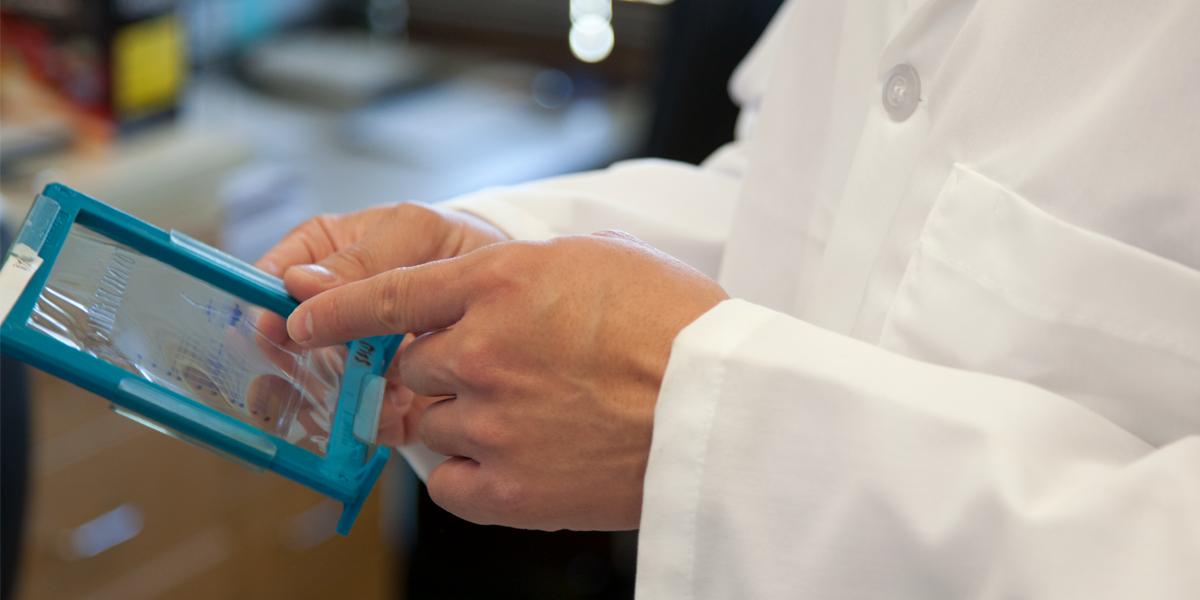Crossing the drug development divide
Ludwig team helps turn discoveries into potential treatments.
There is a stage in the research process that many basic scientists have trouble crossing. They may understand the intricacies of how a cell behaves or how molecules malfunction during disease, and may be brimming with ideas of how to fix them to generate new treatments. But they can’t get their ideas out the laboratory door. Few have the expertise to make a drug-like compound, test it in animals and begin the initial steps toward validating their concepts in human studies. Good ideas often languish.
That’s where Andy Shiau and his group come in. In 2009 the Ludwig Institute hired Shiau and chemist Tim Gahman, who have extensive experience in commercial drug discovery and development, to help its researchers take their ideas from concept to exploratory treatment.
Shiau and Gahman are based in San Diego, where they work with other researchers, from pharmacologists to synthetic chemists. As part of the Hilton Ludwig Cancer Prevention Initiative, the group collaborates with Ludwig scientists to create small molecules that could act like drugs, helps test them in biological assays and in animals, and assesses whether discoveries might be worth turning into treatments. The group’s work also bolsters basic research at the Ludwig Institute, since many of the ideas and reagents it generates are used in the laboratory to help advance scientific findings.
In 2011, their work began to bear fruit. “Last year was great for us,” says Shiau. “We were able to kick some of these projects into high gear.” The researchers tout one early success: developing an agent that may lead to a drug to fight glioblastoma, the most common and most lethal brain cancer in adults. The work began with basic research by scientists at Ludwig who showed that MELK, a protein produced in excess in glioblastomas, helps propel the development of these tumors. Published in 2008, the research indicated that blocking expression of MELK reduces the ability of glioblastoma cells to proliferate and form new cancers. MELK was beginning to look like a good drug target. The next step was to develop an agent that could inhibit its function.
Shiau’s group stepped in. Along with Greg Riggins, a Ludwig scientist in Baltimore, the researchers identified a small molecule that shuts down MELK. They have shown that the agent stops the growth of brain tumor cells in a petri dish, setting the stage for testing in animals.
If successful, their research has the potential to lead to tests in people. To get to that stage, Shiau’s group has the expertise to craft drugs that will meet the standard for evaluation in human trials by working with in-house experts and outsourcing many other aspects of the work, such as compound synthesis and toxicology studies.
Such drug-development work is often done by pharmaceutical and biotechnology companies. But it would have been hard to get industry interest in the MELK project, given that that the science is just emerging, says Web Cavenee, a Ludwig scientist in San Diego. Now Shiau and his collaborators are taking the work to a new level. “Our goal is to do drug discovery that is smart, cost effective and nimble, and in a way that will lead to treatments that will help people,” says Cavenee.
Other projects include developing an inhibitor against another cellular molecule, PLK4, which is involved in regulating proper cell division. An inhibitor has the potential to put a wrench in the growth of cancer cells.
Shiau and Cavenee say that the openness of an Institute like Ludwig enables researchers to collaborate effectively on projects like these. The Institute provides opportunities for basic scientists to think about the next step in their research—translating their discoveries to the clinic and ultimately to patients living with cancer.
Says Shiau, “It is sort of this magic blend of ingredients.”
